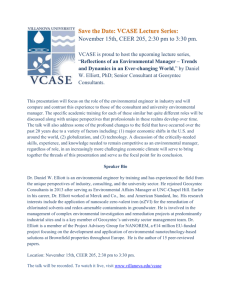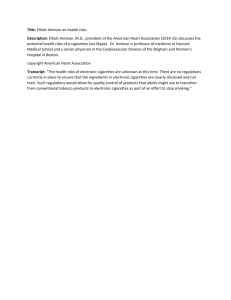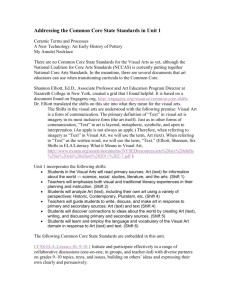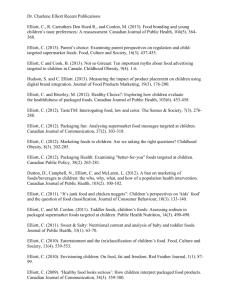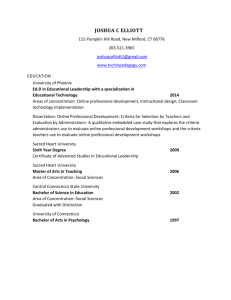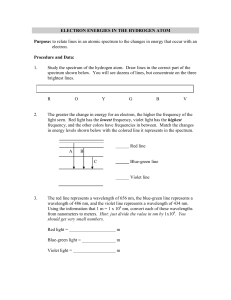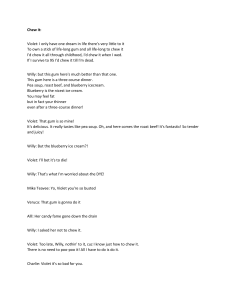violet elliott (1) - Australian Variety Theatre Archive
advertisement
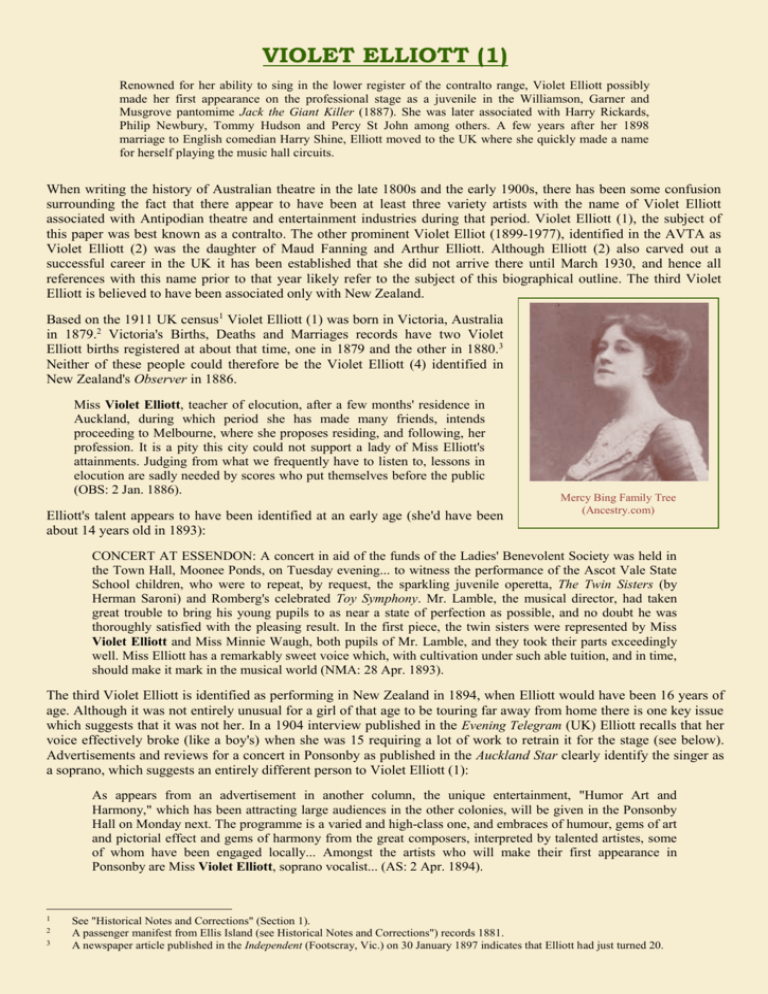
VIOLET ELLIOTT (1) Renowned for her ability to sing in the lower register of the contralto range, Violet Elliott possibly made her first appearance on the professional stage as a juvenile in the Williamson, Garner and Musgrove pantomime Jack the Giant Killer (1887). She was later associated with Harry Rickards, Philip Newbury, Tommy Hudson and Percy St John among others. A few years after her 1898 marriage to English comedian Harry Shine, Elliott moved to the UK where she quickly made a name for herself playing the music hall circuits. When writing the history of Australian theatre in the late 1800s and the early 1900s, there has been some confusion surrounding the fact that there appear to have been at least three variety artists with the name of Violet Elliott associated with Antipodian theatre and entertainment industries during that period. Violet Elliott (1), the subject of this paper was best known as a contralto. The other prominent Violet Elliot (1899-1977), identified in the AVTA as Violet Elliott (2) was the daughter of Maud Fanning and Arthur Elliott. Although Elliott (2) also carved out a successful career in the UK it has been established that she did not arrive there until March 1930, and hence all references with this name prior to that year likely refer to the subject of this biographical outline. The third Violet Elliott is believed to have been associated only with New Zealand. Based on the 1911 UK census1 Violet Elliott (1) was born in Victoria, Australia in 1879.2 Victoria's Births, Deaths and Marriages records have two Violet Elliott births registered at about that time, one in 1879 and the other in 1880.3 Neither of these people could therefore be the Violet Elliott (4) identified in New Zealand's Observer in 1886. Miss Violet Elliott, teacher of elocution, after a few months' residence in Auckland, during which period she has made many friends, intends proceeding to Melbourne, where she proposes residing, and following, her profession. It is a pity this city could not support a lady of Miss Elliott's attainments. Judging from what we frequently have to listen to, lessons in elocution are sadly needed by scores who put themselves before the public (OBS: 2 Jan. 1886). Elliott's talent appears to have been identified at an early age (she'd have been about 14 years old in 1893): Mercy Bing Family Tree (Ancestry.com) CONCERT AT ESSENDON: A concert in aid of the funds of the Ladies' Benevolent Society was held in the Town Hall, Moonee Ponds, on Tuesday evening... to witness the performance of the Ascot Vale State School children, who were to repeat, by request, the sparkling juvenile operetta, The Twin Sisters (by Herman Saroni) and Romberg's celebrated Toy Symphony. Mr. Lamble, the musical director, had taken great trouble to bring his young pupils to as near a state of perfection as possible, and no doubt he was thoroughly satisfied with the pleasing result. In the first piece, the twin sisters were represented by Miss Violet Elliott and Miss Minnie Waugh, both pupils of Mr. Lamble, and they took their parts exceedingly well. Miss Elliott has a remarkably sweet voice which, with cultivation under such able tuition, and in time, should make it mark in the musical world (NMA: 28 Apr. 1893). The third Violet Elliott is identified as performing in New Zealand in 1894, when Elliott would have been 16 years of age. Although it was not entirely unusual for a girl of that age to be touring far away from home there is one key issue which suggests that it was not her. In a 1904 interview published in the Evening Telegram (UK) Elliott recalls that her voice effectively broke (like a boy's) when she was 15 requiring a lot of work to retrain it for the stage (see below). Advertisements and reviews for a concert in Ponsonby as published in the Auckland Star clearly identify the singer as a soprano, which suggests an entirely different person to Violet Elliott (1): As appears from an advertisement in another column, the unique entertainment, "Humor Art and Harmony," which has been attracting large audiences in the other colonies, will be given in the Ponsonby Hall on Monday next. The programme is a varied and high-class one, and embraces of humour, gems of art and pictorial effect and gems of harmony from the great composers, interpreted by talented artistes, some of whom have been engaged locally... Amongst the artists who will make their first appearance in Ponsonby are Miss Violet Elliott, soprano vocalist... (AS: 2 Apr. 1894). 1 2 3 See "Historical Notes and Corrections" (Section 1). A passenger manifest from Ellis Island (see Historical Notes and Corrections") records 1881. A newspaper article published in the Independent (Footscray, Vic.) on 30 January 1897 indicates that Elliott had just turned 20. HUMOUR, ART AND HARMONY: This is the title of an entertainment which, after a successful tour of the colonies, commences a New Zealand tour by a performance in the Ponsonby Hall on Monday night. The programme for the evening is a varied and attractive one and should ensure a good house for the opening night. The performance consists of gems of humour, gems of art after the great masters, and gems of harmony, from the great composers, interpreted by a first class company, amongst whom Miss Violet Elliott, vocalist, Mr Rayward, ventriloquist and dramatic reciter, and Mr F. Will (who has charge of the scenic tableaux), are highly spoken of by the press of the Australian colonies (AS: 7 Apr. 1894). New Zealand Herald 7 Apr. (1894). The following is the more likely continuation of the career of Violet Elliott (1): 1894-1899 In an interview given in 1898 (see below), Elliott indicates that her first engagement with Harry Richards was around 1895. This is confirmed by an advertisement that appeared in The Argus in 1895 for "Mr. Harry Rickard's New Tivoli Minstrels and Specialty Co" at the Opera House. Elliot is billed as "The Charming Young Contralto" - one of "Five New Star Artists (27 July 1895)." ST. JOHN'S ANNIVERSARY SERVICES: Miss Violet Elliott, formerly a scholar of the St John's Sunday School, entranced her audience by her rendering of "Sunshine and Rain," and was deservedly encored, to which she responded; and later on sang the "Fog Bell" with great taste and expression. This young lady has a splendid voice, a good presence, and gave evidence of skilful training. She ought to have a successful career before her in the vocal world (IF: 15 Dec. 1894). THEATRES AND ENTERTAINMENTS: The Earl of Yarmouth's entertainment at the Bijou Theatre last evening, given for the laudable purpose of replenishing the coffers of the Distressed Actors' Fund and the Children's Hospital, was much the same as that presented on Thursday evening, and was received in the some kindly and appreciative spirit by an audience that filled almost all parts of the house. … Songs were contributed by Miss Violet Elliott … (ARG: 2 Feb. 1895). AUSTRALIAN STAGE GOSSIP: Delroy and Lynne, the Banyard Family (7), Slade Murray, J. W. Winton, H. Fitzmaurice, Tudor and Friedman, Larry Dooley, Fred Duncan, James Harvey, McKisson and Kearns, the Perman trio, Ada Baker, Daisy Chard, Violet Elliott, Marion Ainsworth, and Alma Grey are at Melbourne Opera House (OW: 19 Sept 1895). Argus 27 July (1895), 12. THEATRE ROYAL: ROYAL COMIC OPERA COMPANY - IN TOWN: No greater or more convincing proof of the sustained popularity in Hobart of the Royal Comic Opera Company can readily be adduced than the simple one of the Saturday night audiences. … Mention may be made here of Miss Violet Elliott, a finely-built young lady with a voice of much melodious power and promise, who sang a popular song regarding the alleged lapses of a disturbed Quaker in a fashion worthy of a principal. An actress so well dowered by nature should not - provided there are in her the germs of acceptable acting - remain in the chorus long (HM: 10 Feb. 1896). AMUSEMENTS: In reviewing In Town at the Theatre Royal … the Ambiguity ladies were charmingly represented by the Misses Nina and Millie Osborne, Jeannie Smith, Lucy Cobb, Lena Cassellis, and Violet Elliott. The latter young lady, whose pleasing personality and fine contralto voice should bring her into greater prominence, gained a well-merited recall for her singing of "The Quaker," and would appear to advantage in Katisha or kindred operatic roles (CA: 9 May 1896). BREVITIES: Violet Elliott, of the Royal Comic Opera Company, has just signed an engagement for India and the East with Tommy Hudson's Variety Company. This lady is well known, and has been frequently heard in Footscray (IF: 8 Aug. 1896). AMUSEMENTS - HUDSON'S SURPRISE PARTY: Mr. T. P. Hudson advises from Sydney that he will reopen for a short season at the Bijou Theatre, Adelaide, on the 29th inst., after-wards sailing for India by the Himalaya, leaving Adelaide on September 9, and playing in Western Australia en route. The company he has organized for this tour includes Misses Lillian Stanbridge, Amy Gourlay, Violet Elliott, Lillie Linton, Jessie Reed, Edith Hooper, Jessie Williams, Amy Thornton, Ida Rosslyn, Jessie Thornton, Messrs. W. Gourlay, A. Royd, H. Burton, A. McKisson, J. Kearns, Wallace King, and T. P. Hudson. M. Provo and others follow on in January next to proceed to Burmah, China, and Japan with the Surprise Party (SAR: 20 August 1896). • Off to India with Tommy Hudson's Surprise Party:- Misses May Habgood, Lilian Stanbridge (a very warm favourite in the East), Amy Gourlay, Jessie Reed, Edith Hooper, Jessie Williams, Violet Elliott, Lillie Linton, Amy Thornton, and Messrs William Gourlay, A. Royd, H. Burton, A. McKisson, J. Kearns, Wallace King, and T. P. Hudson. Mons Provo is to join, them in January (OW: 3 Sept. 1896). The following par gives another indication of her date and place of birth (although the former is questionable): BREVITIES: Punch writer in a complimentary strain of a young lady who is well known here and who has frequently sung in Footscray: "Pretty Violet Elliott, who was a member of the Royal Comic Opera Company a year back, has made a terrific success in Calcutta, where she is singing at Hudson's Theatre Royal. Violet is the possessor of a magnificent contralto voice, and it is said that when matured it will be quite equal to Ada Crossley's. She is a native of Melbourne and is just turned 20 years old" (IF: 30 Jan. 1897). THEATRICAL WORLD: Miss Violet Elliott, who has been winning much praise and notice by her singing with Tommy Hudson's Company in India, has been seriously ill, but is happily now quite recovered (DNP: 1 May 1897). THE THEATRE ROYAL: The well-known and popular Hudson Surprise Party made their first appearance at the Theatre Royal last evening to a capital house. … Miss Violet Elliott, who has a deep powerful voice, sang "The Mighty Deep" very nicely (MB: 29 June 1897). HUDSON'S SURPISE PARTY: Mr. Tom Hudson has brought with him to Hobart this time, perhaps the most talented and entertaining variety company that have occupied the boards of the Theatre Royal up to date. The vocalists have all remarkably fine voices, whilst the specialities and comic sketches are numerous and intensely amusing. A four nights' season was opened on Saturday evening… Miss Violet Elliott, a Melbourne young lady, has a phenomenal contralto voice of two octaves, ranging from E below the stave, upwards. She sang "The mighty deep," finishing on the remarkably deep note (for a female) already mentioned. She was tremendously applauded and encored (HM: 8 Nov. 1897). Hobart 1897 State Library of Tasmania. An advertisement published in the Otago Daily Times (NZ) in 1897 also records that Hudson's Surprise Party was appearing at the Princess Theatre direct from a tour through India, China and Japan. Among the 18 Star Artists appearing was Miss Violet Elliott singing "The Mighty Deep" (20 Nov. 1897). HUDSON'S SURPRISE PARTY: A house that was crowded downstairs and fairly filled upstairs greeted Hudson's Surprise Party on their first appearance in the Princess Theatre on Saturday night. … Miss Violet Elliott's singing of "The Mighty Deep" proclaimed her to be the owner of a powerful contralto voice, which, naturally enough, was heard to advantage in this severe test (OW: 25 Nov. 1897). [EDITORIAL. "OUR INDUSTRAIL PROGESS"]: Among the many attractive features of the programme to be presented at the Academy of Music this evening by Hudson's Surprise party, we notice "Back from Klondyke" a side splitting farce which concludes the first part of the entertainment. Miss Violet Elliott will sing Sir Arthur Sullivan's beautiful song "The Lost Chord," and in the second part Mr Hudson will play a banjo solo, in place of the item "Lecture on Astronomy" as printed in the programme. The Company leave here for Paeroa to-morrow, where they play two nights. Next week they will play at Waihi and Karangahake and will leave for Australia on Monday week (TSR: 24 Feb. 1898). AMUSEMENTS: [At the Tivoli Theatre] A capital bill is announced for this afternoon and tonight, one of the features of which is the first appearance of Miss Violet Elliott, described as 'Australia's contralto' (EN: 4 June 1898). AMUSEMENTS - THE TIVOLI: A well-arranged programme, with many fresh and interesting items introduced, was sufficient to ensure large audiences at the Tivoli on Saturday, both at the matinee and evening performance. … Among the new arrivals were Miss Lillian Lynton, who possesses a wellcultivated voice, which she used with great advantage in the ballad, "Down at Poverty Row," and Miss Violet Elliott, whom nature has favoured with an attractive presence and a sympathetic contralto voice Her contribution was a song called "Daddy," which was rendered with such correct feeling that the audience insisted upon having a repetition of the last verse. Both ladies will prove a decided acquisition to the company (SMH: 20 June 1898). AUSTRALIAN STAGE GOSSIP: Violet Elliott and Lilian Lynton, both through Maoriland with Hudson's Surprise Party, are at Sydney Tivoli (OW: 7 July 1898). It was around this same period that Elliot was interviewed by a journalist from Referee: MISS VIOLET ELLIOTT: Miss Violet Elliott is making her first appearance at the Tivoli. She is a contralto and a very capable one too as her audiences nightly testify in no unmistakable fashion. Chatting with this lady gave some particulars of her career. "My first engagement", she said, "about three years ago was with Mr Harry Rickards with whom I remained for three months. Then I joined the Firm for comic opera and did seven or eight months in the chorus and as an understudy but unfortunately during the whole time I was not afforded an opportunity to appear in any part. It was owing to that disappointment, and it was very disheartening, that I joined Mr T Hudson for a lengthy tour of the colonies and the Coast extending over eighteen months. After finishing with Mr Hudson I rejoined Mr Rickards and prior to making my present appearance at the Tivoli I did ten weeks at the Melbourne Opera House. Have I had any experiences? No. Things have gone very quietly. No exciting experiences at all except perhaps serious illness from fever on returning from the East?" Do you like the business? "Very much indeed. I thoroughly enjoy singing more especially when I know I have the audience with me." Of course you have ambition? "I shall stick to the variety business as long as it sticks to me though of course my ambition is to get into something higher. If I had my own way I would like to go in for concert singing though unfortunately that does not altogether pay nowadays" (22 June 1898). A marriage in India: STAGE GOSSIP: Harry Shine, variety artist, was married to Violet Elliott on Saturday, December 24, 1898, at St. John’s Church, Calcutta. Funny Tommy Empson (at one time manager for the late Harry Stanley) gave away the bride. Walter Reed, the basso of Hudson’s Surprise Party, was best man (after the groom). Both Mr Shine and Miss Elliott are members of Thos. P. Hudson's Surprise Party, and are well known in the colony. Mr Shine (who is a brother of John L. and Wilfred Shine) was last here with F. M. Clark’s Vaudeville Company, in '94, and Miss Elliott, whose contralto notes went below zero, was here with Hudson's Surprise Party in '97-8. A sequel happened at the wedding evening’s entertainment. While Harry Shine was showing, some enterprising admirer presented him with a perambulator, in which lay, cosily cusconced, twins. Another rabid well-wisher at the same time threw an old slipper at him for luck (OW: 16 Feb. 1899). Then very soon back to Australia: AMUSEMENTS - BIJOU THEATRE: Hudson's Surprise Party will make their reappearance at the Bijou Theatre on Easter Monday night after an absence in India. Misses Edith Mone, Lalla Golmick, Onslow Mackay, Little Ivy Scott, Violet Elliott, Daisy Holly, Gertude Minton, Jessie Williams, Lillie Linton, and Amelle Lieigh, and Messrs. Alf. Sherwin, Hubert Minton, Walter Reely, Gus Gregory, Cinquiharley, Revell Norman, Harry Shine, and Tommy Hudson are all billed to appear on Easter Monday night, and will no doubt fully maintain the reputation held by the Surprise Party (AA: 1 Apr. 1899). Advertiser (Adelaide) 5 Oct. (1898), 2. Wagga Wagga Advertiser 10 Oct. (1899), 3. Evening News 9 Jan. (1900), 1. 1900-1909 The birth of Violet Mary E. Shine to Harry and Violet N. Shine was registered at Balmain North in 1901. In its 13 February 1901 "Shipping News" column the Sydney Morning Herald reports that among the passengers leaving for Fremantle (WA) aboard the Kalgoorlie on 13 February were: Mrs. Harry Shine and infant, and Harry Shine. Almost two months later the Argus (Melb) ran an advertisement for the Bijou Theatre that announced the reopening of the vaudeville season with a long list of performances. The bill also included: the "Re-appearance of Miss Violet Elliott, The Charming Australian Contralto" and "Harry Shine, Unrivalled Patter Comedian, Comic Vocalist, and Dancer" (16 Mar. 1901). The following is an extract from "Old Programmes - Theatrical Records No. 88," an article published in Rockhampton's Morning Bulletin in 1935. In reminiscing about the history of the Theatre Royal in 1901, the author notes the sometimes fickle nature of audiences: Misses Jeannie Johnstone, Emmie Smith, Amy Thornton, Violet Elliott, and Daphne Rowe, and Messrs Arthur Crane, Arthur Albert, Will Watkins and J. Watts were members of Mr Percy St John's Variety and Burlesque Company, which spent the last days of July at the Theatre Royal. The company opened successfully with Cinderella, but when Sinbad was presented on the second night the house was so poor that the company promptly packed up and left for Brisbane (18 May 1935). Other reviews and press articles from the early 1900s include: STAGELAND: Mr. Dix, the New Zealand variety manager, has secured the services of Miss Emmie Owen, late of the Musgrove Comic Opera Company, who has left for that colony. Mr. Philip Newbury will probably sing under his auspices, while Mr. Harry Shine and Miss Violet Elliott will also appear at an early date under his management. New Zealand being a kind of half-way house either for England or America, enables many theatrical plums to be within the reach of Mr Dix (DNP: 12 July 1901). BEHIND THE FOOT-LIGHTS: Harry Shine and his wife, Miss Violet Elliott, leave Australia for America under engagement shortly (DNP: 25 Jan. 1902). THE GHOST WALK: Violet Elliott, wife of Comedian Johnny Shine, through N.Z. recently under P. R. Dix's management, is now a member of Lee and Rial's World's Entertainers, No. 2 show (OW: 28 May 1902). Violet Elliott (Mrs. Harry Shine) will accompany the World's Entertainers (including the Musical Burglar and Salerno) to South Africa (EP: 16 Aug. 1902). MUSIC AND DRAMA: When last heard of, the World's Entertainers were at Mauritius. The Australian contralto, Miss Violet Elliott, wife of the comedian, Mr. Harry Shine, was with them (BA: 30 May 1903). LONDON PERSONAL GOSSIP: Miss Violet Elliott, who is well known in Adelaide to those who patronise the entertainments provided by Mr. Harry Rickards, and who recently arrived in London, has obtained an engagement to air her fine contralto voice at the "Syndicate" halls in London, which include the Alhambra Theatre, the Tivoli, and the Pavilion (AA: 31 Aug. 1903). MUSIC AND DRAMA: Miss Violet Elliott, of Melbourne, was given a good part in The Duchess of Dantzic, by Henry Hamilton, which was to be produced at the Lyric Theatre, London on 17th October. The music of the opera is by Ivan Caryll (BC: 28 Nov. 1903). STAGELAND: According to the latest English files, Miss Carrie Moore was not in the original cast of The Duchess of Dantzic, the "Sans Gene" opera produced at the Lyric Theatre, London, on October 17. Mr. Courtice Pounds and Miss Violet Elliott both received considerable praise for good work in the opera (EN: 5 Dec. 1903). On 22 October 1904, the Cheltenham Chronicle and Gloucestershire Graphic (UK) reported that, "Miss Violet Elliott, an Australian contralto with a voice of phenomenal depth, made a successful first appearance at the Alhambra, London, on Monday. She objects to being called a lady bass." The "lady with the Bass Voice" was nevertheless a popular descriptive with journalists and editors both in the United Kingdom and elsewhere, as the following demonstrate: "LADY WITH BASS VOICE. PHENOMINAL AUSTRALIAN SINGER WHO HAS WONDERFUL COMPASS": Musicians say that it is at least a quarter of a century since a woman sang the lower D, a note which the late Mme. Albani is credited with reaching, but there is a young Australian lady now in London who can accomplish this rare vocal feast. Miss Violet Elliott is a tall and charming brunette, who has been only a few months in this country. Apart from the wonderful lower notes of her register, her voice has a peculiar resonance, which is usually associated with a good baritone, though this by no means destroys its essential femininity. Miss Elliott finds herself in a difficulty, because there are no songs written for the female voice which give her an opportunity of using her lowest notes. She is therefore obliged to sing men's songs. "In Celler Cool," which proves such a stumbling block to many amateurs, has no terrors for her, for it demands a low G, and she has nearly half an octave in reserve when she has sung that note. "The three ballads that I usually employ for my low notes," she said, "are 'Out on the Deep,' 'The Diver,' and 'The Mighty Deep.' I do not like singing songs written for men, however, for people are apt to look upon me as a freak instead of an artist. "I began to study singing in Australia when quite a child, and when I was fifteen years old my voice broke just like a boy's. I had endless trouble in training it afterwards, for my middle notes were so weak. I paid constant attention to those ignoring both my high and low notes for a time. When this trouble was over I turned to them, with the result that I was almost as much astonished with my range as my master was. Roughly speaking, my compass includes two octaves and a fifth, but where can I find a song of such a range?" (Evening Telegram, St John's, Newfoundland - 5 Nov. 19044). In its 9 November 1904 edition, Canada's Victoria Daily Colonist ran the same story, but added: "If I sing a mezzo-soprano song I ignore the lower half of my voice; a contralto ballad leaves two or three notes untouched at each end, while a man’s song gives me no opportunity with the upper notes. I have been called all sorts of things from a mezzo-soprano to 'The Lady Basil' [sic] according to the class of song I happen to have been singing." The acclaim generated in the UK press was acknowledged in both Australia and New Zealand over the next couple of years. 4 http://news.google.com/newspapers?nid=35&dat=19041105&id=8foIAAAAIBAJ&sjid=7ToDAAAAIBAJ&pg=2597,7898579 LOCAL AND GENERAL NEWS. "AN EXTRAORDINARY VOICE": Miss Violet Elliott, a young Australian vocalist, who is now in London, possesses an extraordinary voice. Musicians say that it in at least a quarter of a century since a woman sang the lower D, a note which the late Madame Albani is credited with reaching. But Miss Elliott can accomplish this rare and remarkable vocal feat, and do so with ease. She finds herself in a difficulty, however, because there are no songs written for the female voice which give her an opportunity of using her lowest notes. She is therefore obliged to sing men's songs. Miss Elliott has a full, rich voice in all respects, and is rapidly becoming popular (WE&T: 10 Dec. 1904). AUSTRALIAN "LADY BASS." A PHENOMENAL VOICE: Some people are born basses, some people achieve basses, and some people - they are very few - have basses thrust upon them," says the London Express. Thus wailed in accents of the deepest melancholy, Miss Violet Elliott, the Australian contralto, who sang for the first time at the Alhambra recently. By reason of the amazing depths to which her voice can sink she has been called the "lady bass." And this title has given her the direst of offence. "It sounds like a new drink," she complained, "and I hate it. I will not be called the 'lady bass!'" and she clenched her little fists. Certainly there is in the name the suggestion of heaviness, of stolidity, of masculinity. This is what the audience at the Alhambra expected. But they were to be mercifully disappointed. Instead of the tall, austere, commanding presence they waited for, there slipped on the stage a slight, lissom maiden, with rebellious hair and frightened eyes. Then they settled themselves into their seats and waited for the deep voice of the "lady-bass.” But again they were to be disappointed. The notes that came from the slender throat were high and clear and pure. This was no "lady bass," but the most charming of sopranos. She sang a simple little ballad of "Home, Dearie, Home." There was a lad who would go to sea, and a maid who wished him safe in port. Suddenly there came a promise - just a promise - of the depths to which that voice could sink. Its fulfilment came with the second song, "The Diver," a song written for male bass voices, and for which new band parts had to be hastily written. The singer began almost airily in her clear high notes, but then she went down and down and down - down with the diver "to the 'depths, of the, sea." And her voice was full of a sombre and tragic meaning. But with all its depths there was none of the heaviness and lifelessness that customarily go with the contralto. It was a bass that for all its depths had life and brightness in it. It engulfed the whole wide auditorium with its resonance. It had a strange metallic ring in it - the ring of trumpets. Miss Elliott triumphed, and she almost wept over it. "If," she said afterwards, "I can only achieve fame by sounding fat and wobbly and manlike, I won't have fame at all. I don't want to be a freak; I want to be a woman. Such a fuss, too, all because I can get down to D. And the fun of it is that no one, not even my teacher, discovered it till the other day, though I have sung for years, as the bass in a quartette, half the world over. Now they say that I can go lower than Clara Butt, and they call me the 'lady bass.' I never heard such an insulting name in all my life." This conversation took place in Miss Elliott's house, and the interviewer, who knew that she had been riding about in the wet on the top of an omnibus, and saw that she was smoking cigarettes, asked how she cared for her voice. "Care for it?" cried Miss Elliott. "I don't care for it. I don't live for art's sake, but for my life's sake. Training? The first training I remember was shouting 'Coo-ee' in the Australian bush. I shouted so well that I scared away the 'possum for miles around. With frank and simple courtesy she went down to the hall door to bid the representative of the Express good-bye. With one hand she undid the latch, and with the other took in a parcel which had just arrived. Good-bye!" she called down the street. "And don't forget I'm not a 'lady bass.' 1 may be poor, but thank goodness, I'm a contralto" (NZH: 26 Dec. 1904). BILL OF THE PLAY: Miss Violet Elliott, the lady bass, who is taking London by storm, applied to Williamson in Sydney for an engagement before seeking an engagement in the ' big smoke.' She wouldn't do according to the dictate of his manager, but she has managed to do to the tune of some hundred a week in London (NAPAP: 7 Jan. 1905). DRAMATIC NOTES: Violet Elliott, the Australian vocalist, who has been erroneously called "the lady bass," has been so successful at the Alhambra that her engagement has been extended (CA: 1Apr. 1905). MANCHESTER AMUSEMENTS - ARDWICK EMPIRE: There is an excellent programme this week … Violet Elliott, an Australian Contralto, has a voice of most pleasing quality, and George Ridgewell, a baritone, is also responsible for fine singing (Manchester Courier 23 May 1905). Argus 14 Jan. (1905), 14. The John McCormack Society website5 lists Violet Elliott appearing at the following venues on the dates shown: 1906: 1907: Portsmouth (Theatre Royal; 30 Nov. > Sarah Bernhardt concert) Birmingham (Theatre Royal; 10 Dec. > Bernhardt concert) London (Alexandra Palace; 16 Feb.) Brighton (The Dome; 16 Dec. > Bernhardt concert) In April 1907, the divorce of Elliott and Shine was widely reported. Some of those press reports, and one on Shine's death, appear in Appendix 1. STAGE GOSSIP: Miss Violet Elliot, the Sydney contralto, has been engaged for the London ballad concerts at the Royal Albert Hall (OW: 8 Jan. 1908). In September 1908 Elliot remarried, her second husband being Augustus Duke. The ceremony took place in Westminster. At the time of the 1901 census, Irish-born Duke was a 21-year-old Second Lieutenant living in the barracks at Throxenby, Yorkshire. The marriage, as with her divorce was reported both in the UK and the Antipodes. SOCIAL GOSSIP: Miss Violet Elliott, the gifted Australian singer, was married to Mr. A. Cecil Hare, second son of the late Rev. Canon J. Hare Duke, D.D., County Down, on September 24, at the Union Offices, Poland-street, London (SYM: 4 Nov. 1908). STAGE GOSSIP: Reported that Miss Violet Elliott married in London Captain Cecil Hare Duke, a member of a crack regiment (OW: 18 Nov. 1908). ORANGE BLOSSOM. DUKE-ELLIOTT: [Missing text] will be pleased to read the following reference to the wedding of Miss Violet Elliott, which appeared, together with an excellent photograph of the talented lady, in the London Sketch of September 30, 1908. "Australians mustered in force at the marriage last Thursday of Miss Violet Elliott, one of the many fair singers whom Melbourne has sent home to delight the music lovers of the Old Country. The furore created at the time of Miss Elliott's debut in London is remembered by those interested in voice production. Last Thursday's bridegroom is Mr Cecil Hare Duke of the Royal Garrison Artillery, second son of the late Canon J. Hare Duke" (HG: 22 Jan. 1909). 1910-1940 In 1911 Elliott was living as an army officer's wife in Sierra Leone. By 1912, however, she appears to have returned to England and the stage. Reporting on a concert given by the Manchester Orchestra in the Free Trades Hall on the previous Saturday night the Manchester Courier records: The singing of Miss Violet Elliott was unequal. She possesses a voice of full tone and considerable range, but some of her notes are a little harsh, and her style is as yet imperfectly formed. She was most successful in her first song "Oh! My Heart is Meary" from Goring Thomas's Nadeshda6 (21 Oct. 1912). On 26 March 1915 The Courier (Tunbridge Well, Kent) ran an advertisement for British Zonophone Records being sold by the Orchestrelle Company of Tunbridge Wells. Among them was one by Violet Elliott that included the songs, "Land of Hope and Glory," "There's a Land" and "The Promise of Life." A number of reviews, articles and secondary sources name a Violet Elliott as having been active in theatre and film in the UK during the 1920s. The Internet Speculative Fiction Database,7 for example, links this name to four silent movies produced in the UK. These are: The Gentleman Rider (1919 as Aunt Cynthia), The Edge of Youth (1920 as Hon. Mrs. Allinson), The Romance of a Movie Star (1920 as Mrs. Slade) and The World of Wonderful Reality (1924 as Mrs. Dealtry). While the same entry has Elliott appearing in a 1974 episode of the British TV series, Z Cars this is implausible given that she would have been 95 that year. It is more likely that Violet Elliott (2) was the actress involved. In its review of The Last of Mrs. Cheyney at the Hippodrome in 1927, the Gloucester Citizen records: "Mr. C. Jarvis Walter, as Lord Elton, is sufficiently staid, whilst Miss Violet Elliott extracts the utmost fun from the role of Lady Frinton" (1 Mar. 1927). The Western Morning News (Plymouth and Exeter) reviewed her in the same role at the Theatre Royal the following month, recording: "But, above all, is the acting. One cannot speak too highly of last night's presentation … of Miss Elliott's bluntness of speech, which created much amusement…" (26 Apr. 1927). 5 6 7 http://www.mccormacksociety.co.uk Arthur Goring Thomas's opera Nadeshda (libretto by Julian Sturgis) was first staged in 1890. http://www.imdb.com A passenger manifest from 1938 lists a Violet Hare Duke as a 2nd Class passenger aboard the Johan Van Oldenbarnevelt, sailing from Southampton for the Dutch East Indies on 28 January. Although the passenger's age is given as 56 (making her year of birth 1882), the use of the name "Hare" (one of Augustus Duke's given names) suggests that it's likely to have been Elliott. Her home address was recorded as 27 Pembridge Crescent, Notting Hill Gate, N.II;8 and her occupation "none." The manifest also indicate that she was contracted to go to Villefranche, and intended returning to England. She is recorded as returning to the UK aboard the Christiaan Huygens at Southhampton on 14 March 1938. The passenger manifest notes that while her age was still 56, she would then be living at 92 High Street, Oxford. The "Mercy Bing Family Tree" on Ancestry.com includes details regarding Augustus Duke and Violet Elliott. The site records that Elliot died at 36 St Marks Road, Henley on Thames, Oxfordshire on 18 July 1965. It also contains the photo of Violet at the top of this biography. Although there is no indication of the source, it matches her looks as described in the above press articles. HISTORICAL NOTES AND CORRECTIONS 1. 1911 census (2 April) Person: DUKE, Violet Nestrip Institution: Military Barracks Tower Hill Freetown Sierra Leone West Africa. Name Relation Condition Sex Age Birth Year Occupation Where born DUKE, Violet Nestrip Wife Married F 32 1879 Victoria, Australia RG number: RG14 Piece: 34993 Reference: RG14PN34993 RD641 SD18 ED5 SN9999 Enumeration District: 5. Address: Tower Hill Freetown Sierra Leone West Africa County: Overseas military. No. years marriage: 2. No. children: Nil. The census also shows that Violet Mary Duke, aged 10 and born at Sydney, Australia was a pupil at a private boarding and day school run by the Misses Lucy and Mary Holmes at 39/41 Haverstock Hill, Hampstead (London). 2. Augustus Cecil Hare Duke: Lieutenant A.C.H. Duke is recorded as having been one of nine officers and 83 other ranks aboard the Axim when she sailed for Sierra Leone from Liverpool on 9 August 1907. It seems that he had previously sailed there aboard the same ship with another contingent in 1905. The couple's movements over the next three years can be traced via shipping manifests: • Miss Violet Elliott was a 1st Class passenger aboard the Falaba which sailed from for Liverpool on 1 August 1908 for Gran Canary Island (off West African coast). She is described as English and single or travelling unaccompanied by spouse. • Lieut. A. C. H. Duke leaves Sierra Leone on 24 August for Plymouth aboard the SS Karina. Described as Irish, travelling alone and listed as a 1st Class passenger he disembarks at Liverpool on 4 September 1908. • Lieut A. C. H. Duke departs Liverpool on 13 February 1909 aboard the Avo for Sierra Leone again travelling alone. The details are listed in the English column. • The Ellis Island Ship Database has a list of the 490 passengers who left Liverpool on 30 October 1909 aboard the Campania and arrived in New York on 6 November. Among them is Violet (Duke) Elliot, 28, Single, a resident of London, England. The passenger list shows her to be a "Vocalist... 5'9", of dark complexion with brown hair and grey eyes, of good health and born in Melbourne Australia." Her nearest living relative was named as her sister - "Miss Elliott, 66 Gloucester Cres, Regents Park, London." The original manifest 8 Pembroke Crescent is recorded as Elliot/Duke's address in the 1938 Electoral Register. There is no record of Augustus living there at that time. Ellis Island Foundation (www.ellisisland.org) indicates that she not previously been to the US, and that while there she would be staying with a friend, Miss [A. B. Nilson] at 102 38th Street, NY. • On 12 September 1910 Lieut. A. C. H. Duke and Mrs Duke departed Liverpool aboard the Burutu. Both are shown to be married, and accompanied by their spouse. She is contracted to "Gd. Canary" whilst he to Sierra Leone. • A Mrs Duke, a "British Colonial" either single or unaccompanied by her husband, was aboard the Tarquah when she sailed from Liverpool for Sierra Leone on 15/02/1911. \ • Lieut. A. C. Duke, travelling alone and Irish, embarked at S. Leone on the Mendi, landing at Plymouth. The ship arrived Liverpool on 2 October 1911. He departed Liverpool for Sierra Leone aboard the "Burutu" on 10 April 1912. He was again alone. On 6 November 1912 boards the Mandingo at Liverpool for Sierra Leone. Augustus Duke died in 1943. He was aged 639 The UK National Probate Calender records: DUKE Augustus Cecil Hare C.M.G. D.S.O. retired lieutenant-colonel of 39 Cromwell-road Teddington Twickenham, Middlesex died 6 February 1943 Probate Oxford 15 April to Violet Nesstrip Hare Duke, widow. Effects £6113 5s 7d. 3. The following refers to Elliott's sister. The Pratt children were those of her other sister, Mary (who, as shown below, married Thomas Pratt in 1904): 1911 census (2 Apr): Person: ELLIOTT, Flora Address: 36 Lissenden Mans Highgate Road N W Name ELLIOTT, Flora PRATT, Doris Amy PRATT, Robert Sizar BRADFORD, Hilda Relation Condition Sex Age Birth Year Occupation Where born Head Single F 25 1886 Nil Taking Care Of Sister's Children Victoria Australia Niece Single F 14 1897 At School Croydon Surrey Nephew Single M 5 1906 At School Servant Single F 26 1885 General Servant Domestic London Marylebone London St Pancras RG number: RG14 Piece: 756 Reference: RG14PN756 RG78PN26 RD9 SD4 ED12 SN279 Registration District: St Pancras Sub District: North St Pancras Enumeration District: 12 Parish: St Pancras Address: 36 Lissenden Mans Highgate Road N W County: London 4. According to FreeBMD, Violet H. Duke death (at age 88) was registered at Henley in the September Quarter of 1965. Once again, her calculated birth year is 1877. The district Henley spans the boundaries of the counties of Buckinghamshire, Berkshire and Oxfordshire. The UK National Probate Calender records: HARE-DUKE Violet Nesstrip or DUKE Violet Nesstrip Hare of 36 St. Marks Road Henley-on-Thames Oxfordshire died 18 July 1965 Probate Oxford 4 August to Violet Mary Elliott Lyons widow. £713. 5. London Electoral Register for 1935 records that Elliott and Shine's daughter, Violet Mary Elliott Lyons and her husband Frederick Joseph Lyons were living on the Top Floor of 79 Linden Gardens, Kensington. Their marriage was registered at Kensington in March Quarter 1935. 6. Thomas Sizar Elliott (father): From the Scotch College, Melbourne website: Thomas Sizar Elliott. Born about 1841, the son of Sizar and Sarah (née Nestrip) Elliott, he attended Scotch from 1858–59. He probably played in the first game10, as he was a member of the 1st XI in 1858 and 1859. A clerk for Victorian Railways from 24 February 1862 to 30 June 1893, he married Mary Ann Fish in 1864. Tom died at East Melbourne aged 77, and was buried in the Cheltenham Cemetery on 29 April 1918. PERSONAL: The announcement was made on Saturday of the death of Mr. Thomas Sizar Elliott, at the Hermitage, 11 Palmer street, Jolimont, at the age of 77. Mr. Elliott was the son of the late Mr. Sizar Elliott, who inaugurated Hospital Sunday. Mr. T. S. Elliott was born in Sydney, but resided in Melbourne for 64 9 10 Source: FreeBDM. The item dealt with the first-played game of Australian Rules football. years, for a long period he was employed in the Railways department, but he retired 17 years ago. He leaves a wife, two sons-Mr. W. S. Elliott, paymaster at Aberdare Colliery, New South Wales, and Mr. Reginald Elliott, at the stores branch of railways, Maitland Junction, Western Australia-and three daughters - Mrs. Duke, London; Mrs. Pratt, and Miss Elliott, at Calcutta. The remains are to be interred to-day at the Cheltenham Cemetery. Mr. Elliott was an active member of the Early Pioneer's Association (ARG: 29 Apr. 1918). 7. Henry Sizar Elliott (brother): DEATHS. ELLIOTT: On the 8th June, at Albert Street, Footscray, Henry, the much loved and deeply regretted second son of Thomas Sizar and Mary Annie Elliott, and grandson of Sizar Elliott, J.P., of St. Kilda, aged 16 years and 8 months (IF: 12 June 1886). 8. Mary Elliott: The following items relate to Violet's sister. MARRIAGES: PRATT-ELLIOTT.-December 24, 1903, at Calcutta, by the Rev. C. Allen Clough, Thomas Robert Pratt, to May [sic] Daphne, second daughter of T. Sizar Elliott, of Sydney, N.S.W. (SMH: 26 March 1904) PRATT-ELLIOTT.-December 24, at Calcutta, India, Thomas Robert Pratt to Mary Daphne Elliott (DNP: 15 April 1904). MAINLY ABOUT PEOPLE: Among the passengers by the S.S. Niagara from Vancouver recently were Mr. and Mrs. T. R. Pratt, of Calcutta, who are visiting Australia. Mrs. Pratt, who wears the O.B.E. decoration for war work in Calcutta, is a sister of Violet Elliott, the well-known contralto, is visiting her mother and sisters in Melbourne, and will later come to Western Australia to see her brother, Mr. Reg. Elliott, of Townshend-road, Subiaco, before returning to her home (DNP: 26 Oct. 1920). 9. Thomas Pratt: Could this be Violet's brother-in-law? AN AUSTRALIAN ACTOR'S DIVORCE: In the Divorce Court, London, on July 27, Mr. Justice Barnes had before him the case of "Gribben v. Gribben and Pratt." This was a petition presented by the husband, Mr. Andrew Gribben, an actor, professionally known as Harry Gribben, praying for the dissolution of his marriage on the ground of the alleged misconduct of his wife, also an actress, with the co-respondent, Thomas Robert Pratt. A claim for damages was withdrawn, the co-respondent agreeing to pay £200 to cover damages and costs. Mr Andrew Gribben said he was married to the respondent at Melbourne in 1892. In 1895 they came to England, and apartments were taken at Sussex-street, Pimlico. Sometime after their arrival an engagement was made for them to go to Calcutta to perform, but prior to leaving England he had a very advantageous offer, which he accepted, and he was allowed to cancel his engagement provided he allowed the respondent to go, to which he assented, provided her sister accompanied her. In April, 1896, on her return to England, he saw the respondent, and she then told him that she did not intend to live with him anymore, as she was then living with a gentleman who had made her independent of the stage, and that she was then residing in Gloucester road with him. The jury found for the petitioner, but assessed the damages at £350. His lordship said, as the jury had improved the petitioner's claim as regarded the damages, the matter had better be mentioned to him again when proof was given of the Australian marriage, for which purpose the case was adjourned. Harry Gribben held a very good position on the Australian stage as comedian and eccentric dancer. He played several good engagements under "the firm" (Williamson and Musgrove), notably with the London Gaiety Company and with Mrs Brown Potter on her first visit to Australia. As a teacher of dancing, too, he was well-known in Sydney. Mrs. Gribben is professionally known as Lillie Clitherow. She plays soubrette parts. Her father, W. F. Clitherow, is one of the best-known identities of the Australian stage (BM: 6 Sept. 1897). APPENDIX 1: THE DIVORCE OF VIOLET ELLIOTT FROM HARRY SHINE: COMEDIAN DIVORCED. MR. HARRY SHINE. LONDON, April 10: Mrs. Violet Shine (nee Violet Elliott) has been granted a divorce from her husband, Henry William Shine, the well-known Australian comedian. Mrs. Shine is well known to Adelaide theatrical patrons as a contralto balladist. Mr. Harry Shine is at present appearing in the pantomime Mother Goose in Sydney. The petition set out that Mr. Shine had been guilty of cruelty to his wife and misconduct with an actress in Melbourne (RA: 12 Apr. 1907). THEATRICAL DIVORCE. SHINE v. SHINE. London, April 10: Violet Shine has obtained a divorce from her husband Henry William Shine, an actor, on the grounds of cruelty and his adultery with an actress in Melbourne (KM: 12 Apr. 1907). DIVORCE. SHINE V. SHINE. LONDON, April 12: A plucky fire rescue in Melbourne has led to a divorce suit and a decree nisi in London. Mr. Harry Shine, well-known in the theatrical profession, has been sued by Mrs. Violet Shine for a divorce. The wife accused the husband of cruelty while travelling in India and Australia. At Bendigo he signed the pledge and promised reformation, but he broke his promise, and husband and wife separated. Sometime afterwards Mrs. Shine read in a newspaper that "Mr. Harry Shine, during a fire at the Waverley Hotel, Melbourne, rescued his wife, carrying her in his arms downstairs." The "wife" that Mr. Shine thus rescued was a Miss Renton. Mrs. Shine at once took legal proceedings for a divorce, and the Court has granted her a decree nisi (NM: 23 May 1907). DIVORCE CASES. LONDON, April 12: Mrs. Violet Shine has secured a divorce from her husband, Mr. Harry William Shine, the actor, on the grounds of cruelty and adultery with an actress in Melbourne. [Mrs. Violet Shine is identical with the lady well known on the Australian vaudeville stage as Miss Violet Elliott (contralto vocalist), who appeared with conspicuous success at the Theatre Royal, Rockhampton a few years ago. She was the wife of Henry William Shine, other-wise known as Harry Shine. Sometime after leaving here she went to South Africa with the World's Entertainers. A few months later she appeared in London in a small part in The Duchess of Dantzig, and subsequently created somewhat of a sensation by appearing in several London theatres, among them the Empire, as Miss Violet Elliot, the Australian female baritone (CAP: 20 Apr. 1907). NOTES FROM LONDON: Some little time ago the Melbourne papers published a report describing in glowing terms the heroism of Mr. Harry Shine, an actor, in rescuing his wife in the Waverley Hotel fire. One of the newspapers round its way to London, and it being brought under the notice of Mr. Shine's real wife she naturally wanted to know all about who the lady was who was rescued in Melbourne. The result was that divorce proceedings were instituted, and the case was heard here on Wednesday. The evidence given in the course of the case showed a distressing state of affairs. Mrs. Shine in her affidavit stated that the marriage took place in Calcutta, and that after- wards in Melbourne her husband twisted a lace scarf around her neck and tried to strangle her. He was drunk at the time, and followed up the attempt to strangle her by throwing a cup of tea over her. On another occasion when quite sober he twisted her hand round, hurting her very much. Once in Australia she found him very drunk, remonstrated with him, and took him home. When they arrived home he threw her on the floor and otherwise ill-treated her. Then he went away for three days, returning in an intoxicated condition, and asking for forgiveness, as he had often done before. At Bendigo respondent came home in the middle of the night and dragged her out of bed. She found it was dangerous to stay with him, and the following day she told him she was going away, when he replied, 'You can go to…' Subsequently, while in Bendigo, petitioner and respondent attended before Father Ryan, and respondent, who said to the father that she had been a good wife and he a bad husband, signed the pledge. Subsequently, at Wellington, in the presence of the scene-shifters, he assaulted her, and on the way to Auckland he suffered severely from delirium tremens. Back again in Australia, respondent again treated petitioner badly, but he did not strike her so much, except in their bed room. She had one letter from him promising money for her support, but she had received none, and had been obliged to take engagements in South Africa in order to support herself and child. She afterwards went on tour to India, and then came to England. Mrs. Mary Ann Elliott, mother of the petitioner, said that when sober respondent treated his wife fairly well, but when he was under the influence of drink he was perfectly brutal. She remembered the occasion when he tried to strangle her daughter with a lace scarf. It was in the diningroom, and her other daughters were pre- sent. Witness also saw him throw a cup of tea at her. She had frequently known her daughter to seek refuge from respondent in her sister's bedroom. Petitioner was out of an engagement, and was staying with witness some weeks without any support from respondent. When the baby was a week old witness and another daughter were present when respondent struck petitioner and her father. Petitioner had been remonstrating with respondent about his drinking. Since respondent left petitioner and went to West Australia, he had not been contributing anything to her support. John William Parsons, at present residing in Kennington-road, and formerly engaged as a professional cyclist in Australia, said he knew Harry Shine well. He knew by sight a Miss Renton, who was also in the theatrical profession. While at the Waverley Hotel, in Melbourne, witness was being shown over the place by Mr. Macwraith, the manager, when he saw Harry Shine, who introduced Barbara Renton to him as his wife. On a later occasion he saw them enter the same bedroom, which they occupied together. He remembered the fire which occurred at the Waverley Hotel when Harry Shine rescued Miss Renton and carried her downstairs. Respondent spoke of his feat to everybody, and referred to Miss Renton as his wife. Witness had seen them constantly together. A decree nisi, with costs and custody of the child, was made (KM: 13 May 1907, 2). The matter was also reported in the English press: IN THE DIVORCE COURT. A THEATRICAL CASE: In London on Wednesday Mrs. Violet Shine, an actress, was granted a divorce because of the cruelty, desertion, and adultery of her husband, Mr. Henry William Shine, an actor. It was stated the parties were married in 1898 at Calcutta, and they afterwards toured all over the world. It was stated that respondent treated his wife with great cruelty, especially when he was under the influence of drink. Once he tried to strangle her. In 1902 he deserted her. The adultery was discovered in a curious way. Petitioner received a newspaper containing an account of a fire which occurred at a Melbourne Hotel, and the report set out that “Harry” Shine had rescued his wife by carrying her downstairs. This lady turned out to be Miss Barbara Renton, an actress, with whom he had been living (The Citizen, Gloucester, 10 April 1907) The marriage of Harry Shine to Eliza J. Renton was registered at Sydney in 1907. Shine died at St Vincent's Hospital on 11 September 1909 "from a general break-up up of the constitution." He was aged only 38. On 18/09/1909, the US entertainment publication, Variety, reported: ENGLISHMAN DIES IN AUSTRALIA. (SPECIAL CABLE TO VARIETY.): Harry Shine, a noted comedian here, although born in England, died here today. The deceased was about 46 years old and had been in this country six years. His brothers, J. L. and Wilfred, are in England at present. Violet Elliott was Mrs. Harry Shine until recently. Divorce proceedings parted them. Contributed by John Leplaw First published on 18 July 2013, the 45th anniversary of Violet Elliott's death. Published: 18/07/2013 NB: The URL for this PDF will change each time it is updated. If you wish to cite or link to this record please use the following: Australian Variety Theatre Archive • http://ozvta.com/practitioners-e/ © Copyright 2013 John Leplaw
